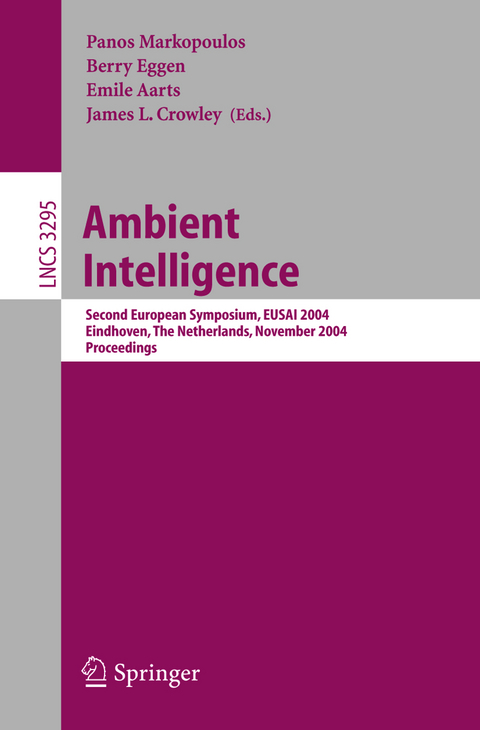
Ambient Intelligence
Springer Berlin (Verlag)
978-3-540-23721-1 (ISBN)
Ubiquitous Computing: Software Architectures, Communication, and Distribution.- Super-distributed RFID Tag Infrastructures.- Using Ontologies to Address Key Issues in Ubiquitous Computing Systems.- Performance Evaluation of Personal Agent Migration Policies in an Ambient Use Case Scenario.- QoS Provision Using Dual RF Modules in Wireless LAN.- Using Cooperative Artefacts as Basis for Activity Recognition.- Privacy Protection in Memory-Based Collaborative Filtering.- Context-Aware, Ontology-Based Service Discovery.- Context-Based Service Access for Train Travelers.- System for Monitoring and Coaching of Sportsmen.- From Imagination to Experience: The Role of Feasibility Studies in Gathering Requirements for Ambient Intelligent Products.- Context Sensing and Machine Perception.- Using Integration Frameworks for Developing Context-Aware Applications.- A Generic Topology for Ambient Intelligence.- A Distributed Location Sensing Platform for Dynamic Building Models.- Distributed Feature Extraction for Event Identification.- Towards an Extensible Context Ontology for Ambient Intelligence.- Integrating Handhelds into Environments of Cooperating Smart Everyday Objects.- Remote Code Execution on Ubiquitous Mobile Applications.- The PLANTS System: Enabling Mixed Societies of Communicating Plants and Artefacts.- Multiple User Profile Merging (MUPE): Key Challenges for Environment Awareness.- Human Computer Interaction in Ambient Intelligence Environments.- Towards a Playful User Interface for Home Entertainment Systems.- Shaping the Ambience of Homes with Domestic Hypermedia.- Tangible Computing in Everyday Life: Extending Current Frameworks for Tangible User Interfaces with Personal Objects.- End-User Configuration of Ambient Intelligence Environments: Feasibility from a User Perspective.- VIEWs: Visual Interaction Enriched Windows.- Information Capture Devices for Social Environments.- Rich Interaction: Issues.- From Metaphors to Simulations to Idioms: Supporting the Conceptualisation Process.- Algorithms, Ontologies, and Architectures for Learning and Adaptation.- CAMELEON-RT: A Software Architecture Reference Model for Distributed, Migratable, and Plastic User Interfaces.- A Fair Energy Conserving Routing Algorithm for Wireless Sensor Networks.- Distance-Based Access Modifiers Applied to Safety in Home Networks.- AmbieSense - A System and Reference Architecture for Personalised Context-Sensitive Information Services for Mobile Users.- Realising the Ambient Intelligence Vision Through the Deployment of Mobile, Intentional Agents.- Ambient Intelligence Using KGP Agents.- Services Platforms for Context-Aware Applications.- Modelling Context: An Activity Theory Approach.- Confidence Estimation of the State Predictor Method.
| Erscheint lt. Verlag | 27.10.2004 |
|---|---|
| Reihe/Serie | Lecture Notes in Computer Science |
| Zusatzinfo | XIII, 389 p. |
| Verlagsort | Berlin |
| Sprache | englisch |
| Maße | 155 x 235 mm |
| Gewicht | 602 g |
| Themenwelt | Mathematik / Informatik ► Informatik ► Betriebssysteme / Server |
| Informatik ► Software Entwicklung ► User Interfaces (HCI) | |
| Schlagworte | adaptive syste • Adaptive Systems • Ad-Hoc Networking • Ambient Intelligence • CompTIA RFID+ • context-aware services • cooperative environments • handheld devices • Hardcover, Softcover / Informatik, EDV/Betriebssysteme, Benutzeroberflächen • HC/Informatik, EDV/Betriebssysteme, Benutzeroberflächen • Intelligente Systeme • intelligent homes • Learning Algorithms • mobile networks • Ontologies • Pervasive Computing • privacy • Radio-Frequency Identification (RFID) • software architecture • ubiquitous computing • wearable computing |
| ISBN-10 | 3-540-23721-6 / 3540237216 |
| ISBN-13 | 978-3-540-23721-1 / 9783540237211 |
| Zustand | Neuware |
| Haben Sie eine Frage zum Produkt? |
aus dem Bereich


